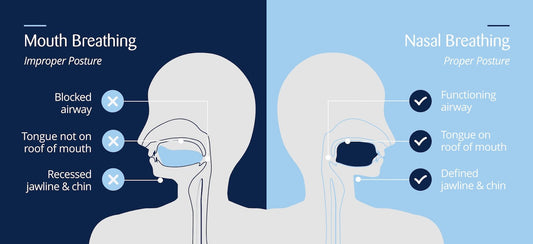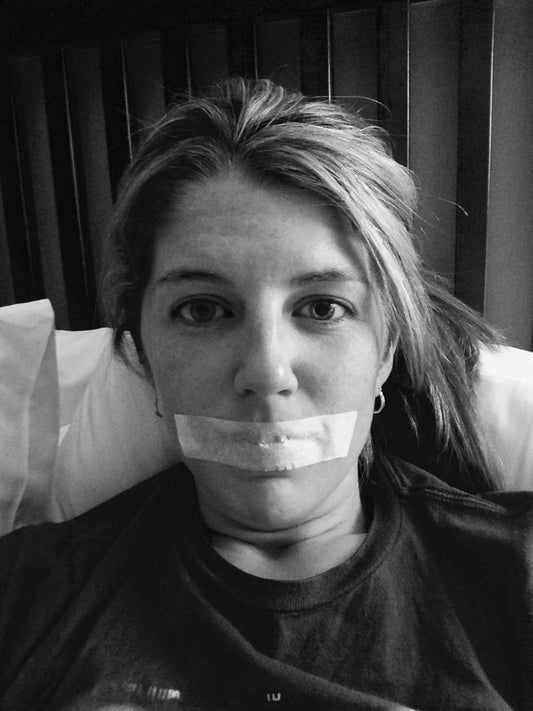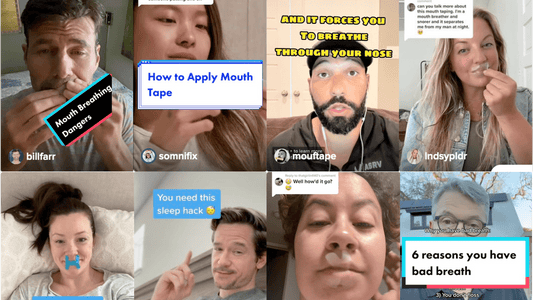Do you breathe mostly through your mouth or your nose?
Your breathing habits can significantly impact your overall health.
Mouth breathing is linked to numerous issues, while nasal breathing offers benefits.
Here’s how switching from mouth to nose breathing could transform your wellbeing.
Problems Associated With Mouth Breathing
Mouth breathing refers to inhaling and exhaling air primarily through the mouth rather than the nose.
Many people develop habitual mouth breathing due to blocked nasal passages, anatomical irregularities, or poor posture. But is this breathing pattern problematic?
Potential downsides include:
- Sleep apnea – Recurrent pauses in breathing from tissue obstruction. Mouth breathing worsens this.
- Snoring – Noisy vibration of throat tissues when air passes through. More likely when mouth breathing at night.
- Dry mouth – Mouth breathing bypasses the humidifying effects of the nasal cavity, resulting in an overly dry mouth. This allows cavity-causing bacteria to thrive.
- Tooth decay – Reduced saliva means less protection of tooth enamel from bacteria. The mouth’s pH also drops. Both increase risk of decay.
- Halitosis – With less saliva production, mouth bacteria build up leading to unpleasant bad breath.
- Jaw misalignment – Chronic mouth breathing can cause crooked teeth or jaw asymmetry from uneven pressure. This may require orthodontics to correct.
- Poor sleep – Reduced oxygenation and sleep disruptions from snoring and apnea lead to non-restorative sleep.
As you can see, mouth breathing clearly correlates to a number of health issues. But there’s an easy solution.
How Mouth Taping Can Encourage Nasal Breathing
Mouth taping involves placing a piece of porous tape like the SomaBody Mouthtape over the lips at bedtime. This gently keeps the mouth closed and promotes nasal breathing overnight. With routine use over weeks and months, your body adapts to favour nose breathing 24/7.
Taping provides resistance that exercises and expands the airways. The nasal passages warm and humidify airflow optimally. This is why many functional medicine doctors and dentists now recommend simple mouth taping as a way to re-train healthy, nasal breathing habits.
Benefits of Making the Nasal Breathing Switch
Here are some of the biggest benefits you may gain from converting to predominantly nose breathing:
- Improved oxygen intake – Nasal breathing humidifies and filters air, allowing more oxygen to reach the lungs compared to mouth breathing.
- Better oral hygiene – Nasal breathing preserves saliva production and pH to protect teeth from bacteria and decay.
- Less dry mouth – Breathing through the humidifying nasal passageways prevents dry, irritated oral tissues.
- Reduced halitosis – The bacteria buildup that causes bad breath is diminished with increased saliva production.
- Less snoring and apnea – Nasal breathing prevents the throat-drying that leads to tissue vibration and obstruction.
- Better sleep quality – The improved oxygenation of nose breathing enhances sleep.
- Corrected jaw alignment – Nasal breathing encourages proper tongue posture and evenly distributed jaw pressure.
As you can see, switching from chronic mouth to nose breathing offers tremendous benefits for your overall health and wellbeing.
And mouth taping is a simple, non-invasive way to facilitate this beneficial transition for life.
Try it today!




